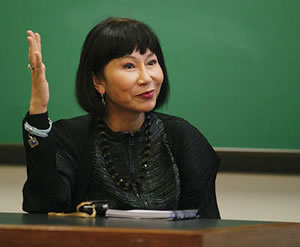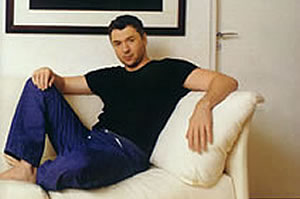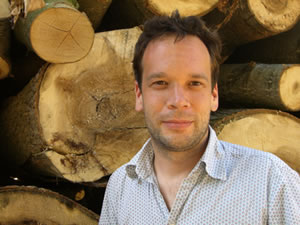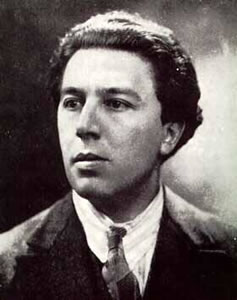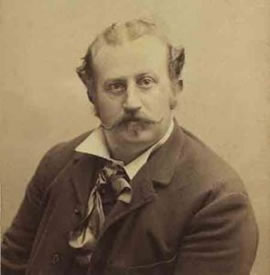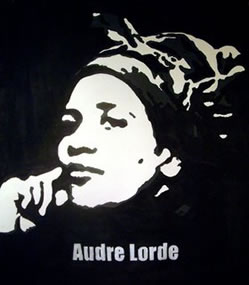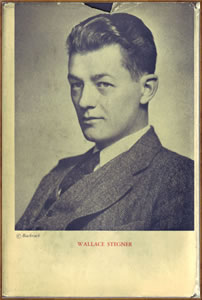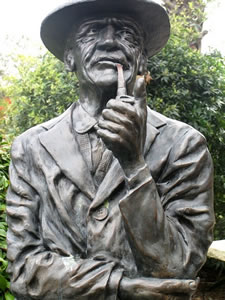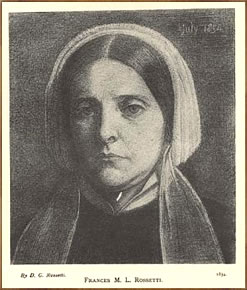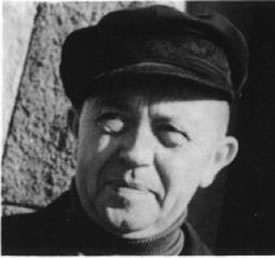De Iraanse schrijfster Shahrnush Parsipur werd geboren op 17 februari 1946 in Teheran. Zie ook mijn blog van 17 februari 2008 en ook mijn blog van 17 februari 2009.
Uit: Touba and the Meaning of Night (Vertaald door Kamran Talattof and Havva Houshmand)
„He remembered the chaos of war in the city of Herat, and the flood of deserters, the hunger, and the inflated food prices. He remembered how he had thought that if only he could spread his body on the earth so it would cover these four walls, if only he could for one second take her with love and aggressiveness, then all wars would end. People would become calm. They would look after their own business, and there would never be famine. And after that loving domination, he would have only to give orders, and the lady would submit. She might give birth, she might not; she might bear fruit, she might not. Whether the sky poured rain or not, everything would be at his command.
When his father died after a long illness, he was left with the responsibility for the many women in the family, those who did their weaving in the basement of the house. They were from the city of Kashan, where weaving was a tradition. His brothers were all in the carpet business, but he had turned to the sciences. Every time he entered the house and announced his arrival by invoking the name of God, the women would run to different corners to cover their hair. Haji enjoyed their imposed silence when he was there, and, without knowing how or why, he cared for their affairs. He would arrange for the girls’ marriages and find wives for their sons. In order to take care of everyone’s needs he spent his own youth without a wife. Unknowingly, he had married the lady earth. And though he did not confess it, he feared her. He was afraid of her chaotic laws and her famines. At the age of fifty when he finally married his illiterate wife, he actually enjoyed her ignorance and simplicity. A single sharp glance was enough to put the woman in her place, and the turning wheel of life’s activity continued.
After the incident of the Englishman, having paced the yard of his home for many long days, Haji Adib finally came to the conclusion that women do eventually lose their innocence. In fact, the lady was never asleep, nor even half asleep. Rather, she was always awake and spinning in frenzy. It was just this turning that caused the seasons to follow one another, floods to occur, and droughts to descend. The rhythmic sound of the shuttle comb on the loom now implied something different.“
Shahrnush Parsipur (Teheran, 17 februari 1946)
De Iraanse schrijver Sadegh Hedayat werd geboren op 17 februari 1903 in Teheran. Hij stamde uit een adelijke familie met groot aanzien. Zijn oergrootvader Mirza Reza Qoli Khan Hedayat was een beroemde geschiedschrijver, dicher en opvoeder van prinsen in het Iran van de 19e eeuw. Hedayat bezocht het gymnasium in Teheran, maar hij moest deze na een jaar wegens een oogziekte al weer verlaten. Hij bezocht daarna de Franse missieschool St. Louis, waar hij de Franse taal en literatuur leerde kennen. Hij begon later aan diverse studies in Frankrijk. Depressief en vol twijfels aan zichzelf deed hij in 1929 een zelfmoordpoging in de rivier de Marne. Deze mislukte echter. Zonder zijn studies te voltooien keerde hij naar Iran terug en had hij allelei baantjes voordat hij weer naar Frankrijk terug ging. Hij bleef zijn hele leven de westerse literatuur bestuderen als ook de Iraanse geschiedenis en folklore. Hij publiceerde talrijke short stories, novellen, een toneelstuk, twee historische drama’s, satires en kritieken. Zijn belanrijkste boek is wel „De blinde uil“ uit 1937.
Uit: Myth of Creation (Vertaald door Ali Sadri)
„In the middle of an elaborate assembly O is seated on a throne shrouded with jewels. He is an old man leaning lazily against gold-threaded pillows covered with precious stones. He has a long beard, silver hair, round spectacles and is warring loose clothing also covered with jewels. A black slave holding an umbrella stands over him while a fair-skinned young maiden fans him.
The four archangels stand at attention encircling the throne. On the right stand Gabriel and Michael while on the left Izrael and Raphael. All except Izrael are dressed like Roman soldiers fully equipped with suits of armor, shields, helmets, and knee-high boots; their long swords hanging from their waists, and their wings resting on their backs. Izrael on the other hand, his face resembling death, hangs a long, black cloak on his back and instead of a sword, holds a sickle in his hand.
Behind them a group of mermaids and virgins with tight-fitting head-covers gaze at the assembly and the slaves in turn gawk at the virgins with lustful eyes. In one corner of the room Lucifer stands erect with exaggeratingly arched eyebrows and pointed beard wearing a red cloak, coned hat, and a wide heavy sword on his belt.
In the middle of the room, the provocatively dressed virgins sing and dance moving sinuously about. One in a translucent dress dances flirtatiously and sidesteps towards the throne. O takes out a coin from his belt and throws it to her. The musicians and the jesters stop simultaneously as O half rises from his throne and gives the be-silent signal. He produces a piece of paper from his side and begins to read.
“Behold, this is the truth and nothing but the truth,” he swallows. “In spite of old age and infirmity, I’ve been busy for the past few days. The first day I created light, then I created the earth, then the sky, then the sea, rocks, mud, etc.” He pauses for a breath. “Now I would like to demonstrate my power and leave behind an everlasting legacy. From my will, shall roam upon earth–which is a member of the solar system–multitude of beasts that will be governed by Adam. From mud, I shall make Adam and the beasts.”
Sadegh Hedayat (17 februari 1903 – 9 april 1951)
De Chinese schrijver Mo Yan werd geboren op 17 februari 1955 in Gaomi in de provincie Shandong. Zie ook mijn blog van 17 februari 2009.
Uit: Frog (Vertaald door Howard Goldblatt)
„Sir, I was the second child my midwife aunt delivered.
When my mother’s time came, my grandmother did what tradition called for her to do: She washed her hands, changed clothes, and lit three sticks of incense, which she stuck in a burner in front of the ancestral tablets. Then she kowtowed three times and sent all the males in the family outside. It was not my mother’s first delivery: two boys and a girl preceded me. You’re an old hand at this, my grandmother said, you don’t need any help. Just take your time. My mother replied: Mother, I don’t feel so good about this one, there’s something different. My grandmother wouldn’t hear of it. How different can it be? she said. You don’t expect to have a unicorn, do you?
My mother’s feeling did not betray her. My brothers and sister all came out headfirst. Me? Leg first.
My grandmother was scared witless when she saw that tiny calf of mine emerge. There’s a popular saying in the countryside that goes: If a leg is foremost, then you owe a ghost. Owe a ghost? What does that mean? It means that someone in the family had an outstanding debt in a previous life, and that the person owed returns as a newborn baby intent on making life hard on the woman in labor. Either mother and child die together or the child hangs around till a certain age, then dies, leaving the family destitute and devastated. So Grandma tried her best to appear calm. This one, she said, is born to run – a lackey. He’ll grow up to be an official’s go-fer. Now, don’t worry, she said, I know just what to do. She went out into the yard, where she picked up a copper basin, brought it back inside, stood at the foot of the bed, and beat it like a cymbal with a rolling pin – Bong! Bong! Come out, she shouted, come out now! Lao ye wants you to deliver a feathered urgent message, so you’re in for a whipping if you don’t come out right this minute!
Sensing that something was seriously wrong, Mother tapped on the window with the bed whisk and shouted to my sister, who was waiting anxiously out in the yard, Man – my sister’s name – go fetch your aunt, and hurry!“
Mo Yan (Gaomi, 17 februari 1955)
De Russische schrijver, regisseur en acteur Yevgeni Grishkovetz werd geboren op 17 februari 1969 in Kemerovo. Zie ook mijn blog van 17 februari 2009.
Uit: Das Hemd (Vertaald door Beate Rausch)
„Autos fuhren vorüber. Viele! Ich hob die Hand. Ein Taxi hielt.
»Guten Abend. Zur Ostoschenka?« fragte ich und musterte Auto und Fahrer. ›In Ordnung‹, dachte ich.
»Bitte sehr«, sagte der kräftige Mann am Steuer. Er hatte langes Haar, war glattrasiert und trug eine runde Brille. Er hatte einen hellen Pullover an. Er lächelte.
»Wissen Sie, wie man da hinkommt?«
»Sie werden es nicht glauben! Das weiß ich!« antwortete er. »Da mußte ich schon öfter hin. So ungefähr …«, er tat so, als würde er es überschlagen und im Kopf rechnen, »eine Million Mal.«
Ich nahm auf dem Rücksitz Platz, und wir fuhren los. Der Fahrer schaltete Musik ein. Nicht laut, sondern … angenehm. Er hatte eine gute Anlage im Auto, das hörte man an der Klangqualität. Er hatte irgendeinen Jazz eingelegt. Ich verstehe nichts davon … von Jazz. Für mich ist das eine einzige endlose und verschlungene Komposition. Aber jetzt war es angenehm. Ich schloß leicht die Augen, dadurch zerfielen die Lichter der Stadt und der Autos ringsum und wurden zu langen Strahlen. Und da – das Taxi, die Lichtstreifen, der Jazz, der langhaarige Fahrer mit seiner runden Brille, der Geruch des Wagens, ich werde beschattet … Amerika!!!
»Stört Sie die Musik? Soll ich vielleicht leiser stellen?« fragte der Fahrer. »Nur das Radio mach ich nicht an. Ich höre kein Radio.«
»Alles wunderbar! Mir gefällt’s. Danke«, antwortete ich.
»Wenn Sie rauchen wollen, bitte, aber Radio auf keinen Fall!« Er hatte eine tiefe und sehr angenehme Stimme.
»Danke, ich rauche nicht. Aber was haben Sie denn gegen Radio?«

Yevgeni Grishkovetz (Kemerovo, 17 februari 1969)
De Duitse schrijver Frederik Hetmann (eig. Hans-Christian Kirsch) werd geboren op 17 februari 1934 in Breslau. Hij groeide op in Neder-Silezië, vluchtte na de oorlog eerst naar Thüringen en in 1949 naar het westen. Hij studeerde in Frankfurt am Main, München en Madrid pedagogie, Engels, Romanistiek, filosofie en politicologie. Sinds 1962 werkte hij als zelfstandig schrijver. In 1972 werd hij lector en uitgever bij de Otto-Maier-Verlag, maar dat beroep gaf hij zes jaar later al weer op om zich aan het schrijven te wijden. Hij werd bekend met zijn verzamelingen en vertalingen van sprookjes, mythen en sagen en zijn biografieën. Ook schreef hij roman in het fantasy-genre.
Uit: Reisender mit schwerem Gepäck. Leben und Werk des Walter Benjamin
„Eine zentrale Frage im Werk Benjamins, die wahrscheinlich auch in nachdenklicheren Stunden eines jeden, der diese Zeilen liest, schon einmal aufgetaucht ist, lautet: Was lässt sich über den Verlauf der Geschichte sagen? Oder, um es konkreter auszudrücken: Hat die Menschheit, deren Teil wir alle sind, trotz aller Kriege und anderer Gewalttaten noch eine Zukunft? Und welches wären die Voraussetzungen, um als Zeitgenossen in der Gegenwart zu einer Zukunft, in der es für den Menschen noch Hoffnung auf ein Leben ohne Not und Verfolgung geben sollte, beizutragen?
Benjamins Vorschlag dazu ist es – und diesem Thema gilt ein Hauptstrang seines Denkens, bei dem er kurz vor seinem tragischen Ende noch zu entscheidenden Aussagen gelangte – auf eine ganz bestimmte Art und Weise, die Vergangenheit zu betrachten und aus dieser Betrachtung Konsequenzen für die Gegenwart und die Zukunft zu ziehen.
Wir werden sehen, wie er entdeckt und darstellt, dass die Wurzeln für die Probleme des 20. und auch des 21. Jahrhunderts sich schon im 19. Jahrhundert abzeichnen und dort vor allem in der Fortschrittsgläubigkeit und in der Verherrlichung und Glorifizierung der Warenwelt liegen. Waren werden seither zu einem Fetisch. Dass Waren nicht mehr nur allein zur Befriedigung eines Lebensbedürfnisses oder eines Wunsches dienen, sondern selbst zu magisch verklärten Gegenständen geworden sind, ist heute für jeden selbst einsichtig, der auch nur für eine
Viertelstunde die Werbung im Fernsehen anschaut. Also wäre das eine trivialselbstverständliche
Einsicht? Für uns ist es das wohl geworden. Komplizierter wird es schon, wenn man sich fragt, wie es zu dieser Verzauberung der Warenwelt gekommen ist und welche Konsequenzen sie hat.
Man hat gesagt, Benjamins Bedeutung als Philosoph habe in seiner Fähigkeit bestanden, zwei scheinbar so weit von einander entfernt liegende philosophische Systeme wie das des Marxismus und das der jüdischen Mystik zu einer offenen Philosophie der Zukunft zu verbinden. Man kann dies, je nach eigenem Standpunkt, positiv oder negativ deuten, und man hat es getan.“
Frederik Hetmann (17 februari 1934 – 1 juni 2006)
De Duitse dichteres, schrijfster en caberetiere Emmy Hennings werd geboren op 17 februari 1885 in Flensburg. Zie ook mijn blog van 17 februari 2008 en ook mijn blog van 17 februari 2009.
Nach dem Cabaret
Ich gehe morgens früh nach Haus.
Die Uhr schlägt fünf, es wird schon hell,
Doch brennt das Licht noch im Hotel.
Das Cabaret ist endlich aus.
In einer Ecke Kinder kauern,
Zum Markte fahren schon die Bauern,
Zur Kirche geht man still und alt.
Vom Turme läuten ernst die Glocken,
Und eine Dirne mit wilden Locken
Irrt noch umher, übernächtig und kalt.
Lieb mich von allen Sünden rein.
Sieh, ich hab manche Nacht gewacht.
Gesang zur Dämmerung
für Hugo Ball
Oktaven taumeln Echo nach durch graue Jahre.
Hochaufgetürmte Tage stürzen ein.
Dein will ich sein –
Im Grabe wachsen meine gelben Haare
Und in Holunderbäumen leben fremde Völker
Ein blasser Vorhang raunt von einem Mord
Zwei Augen irren ruhelos durchs Zimmer
Gepenster gehen um beim Küchenbord.
Und kleine Tannen sind verstorbene Kinder
Uralte Eichen sind die Seelen müder Greise
Die flüstern die Geschichte des verfehlten Lebens.
Der Klintekongensee singt eine alte Weise.
Ich war nicht vor dem bösen Blick gefeit
Da krochen Neger aus der Wasserkanne,
Das bun
te Bild im Märchenbuch, die rote Hanne
Hat einst verzaubert mich für alle Ewigkeit.

Emmy Hennings (17 februari 1885 – 10 augustus 1948)
Hier met haar echtgenoot Hugo Bal
De Amerikaanse schrijver Chaim Potok werd geboren in New York City op 17 februari 1929. Zie ook mijn blog van 17 februari 2007 Zie ook mijn blog van 17 februari 2008 en ook mijn blog van 17 februari 2009.
Uit: The Chosen
„Danny’s block was heavily populated by the followers of his father, Russian Hasidic Jews in somber garb, whose habits and frames of reference were born on the soil of the land they had abandoned. They drank tea from samovars, sipping it slowly through cubes of sugar held between their teeth; they ate the foods of their homeland, talked loudly, occasionally in Russian, most often in a Russian Yiddish, and were fierce in their loyalty to Danny’s father.
A block away lived another Hasidic sect, Jews from southern Poland, who walked the Brooklyn streets like specters, with their black hats, long black coats, black beards, and earlocks. These Jews had their own rabbi, their own dynastic ruler, who could trace his family’s position of rabbinic leadership back to the time of the Ba’al Shem Tov, the eighteenth-century founder of Hasidism, whom they all regarded as a God-invested personality.
About three or four such Hasidic sects populated the area in which Danny and I grew up, each with its own rabbi, its own little synagogue, its own customs, it own fierce loyalties. On a Shabbat or festival morning, the members of each sect could be seen walking to their respective synagogues, dressed in their particular garb, eager to pray with their particular rabbi and forget the tumult of the week and the hungry grabbing for money which they needed to feed their large families during the seemingly endless Depression. The sidewalks of Williamsburg were cracked squares of cement, the streets paved with asphalt that softened in the stifling summers and broke apart into potholes in the bitter winters. Many of the houses were brownstones, set tightly together, none taller than three or four stories. In these houses lived Jews, Irish, Germans, and some Spanish Civil War refugee families that had fled the new Franco regime before the onset of the Second World War. Most of the stores were run by gentiles, but some were owned by Orthodox Jews, members of the Hasidic sects in the area. They could be seen behind their counters, wearing black skullcaps, full beards, and long earlocks, eking out their meager livelihoods and dreaming of Shabbat and festivals when they could close their stores and turn their attention to their
prayers, their rabbi, their God.“

Chaim Potok (17 februari 1929 – 23 juli 2002)
De Spaanse dichter Gustavo Adolfo Bécquer werd op 17 februari 1836 in Sevilla geboren. Zie ook mijn blog van 17 februari 2007 en ook mijn blog van 17 februari 2008 en ook mijn blog van 17 februari 2009.
A Light
(Rima LXXI)
Do you not see something
shining and weeping
faraway amid the trees
of the intricate woods? It’s a star.
Now nearer it appears
visible as if through tulle,
shining on the portico
of the hermitage. It’s a light.
This fast race is run.
Disillusionment. The light
we have followed is neither
lamp nor star. It’s a candle.
Vertaald door Michael Smith
Rhyme LII. The dark-winged swallows will return…
The dark-winged swallows will return
to hang their nests beneath your eaves,
and before your windows once again
beckon with their wings;
but those whose flight restrained
your beauty and my joy to learn,
those who came to know our names…
those…will not return!
The twining honeysuckles will return
your garden walls to climb
and on another afternoon, more lovely still,
again their flowers will bloom;
but those with sparkling drops of dew,
which we’d watch trembling, yearn
and fall, like teardrops of the day…
those…will not return!
From love will come once more the sound
of burning words to ring;
your heart from within its
soundest sleep
perhaps will rise again;
but mute, entranced and kneeling down
as adoring God before His throne,
as I have loved you…accept the truth!
they will not love you so!
Gustavo Adolfo Bécquer (17 februari 1836 – 22 december 1870)
Portret, geschilderd door zijn broer Valeriano Bécquer
Zie voor nog meer schrijvers van de 17e februari ook mijn vorige twee blogs van vandaag.










